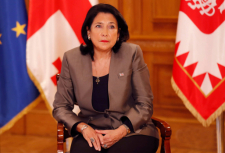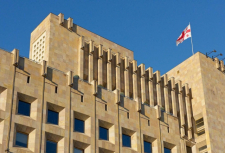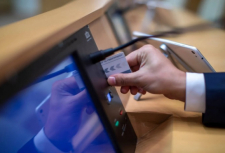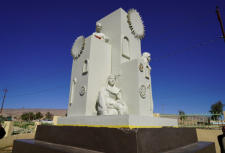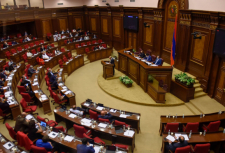Angelina Jolie Interviews Nadia Murad for TIME Magazine
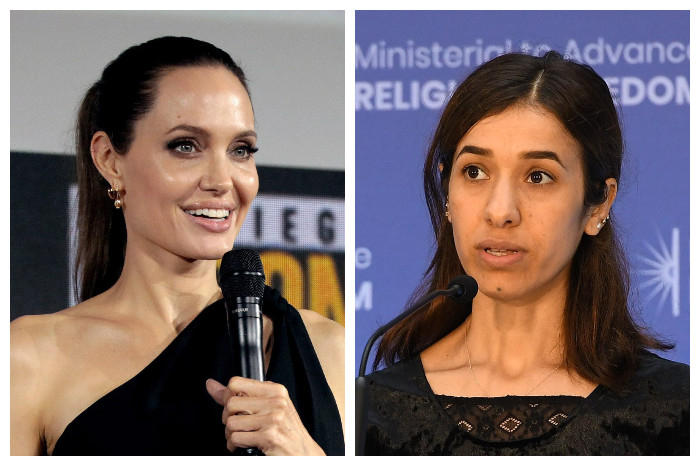
The UN Security Council met this week as chilling reports emerge of rape and sexual violence being used against women and children during the Russian invasion of Ukraine. One of the speakers was Nobel Laureate and justice campaigner Nadia Murad, who recently launched the Murad Code, a global code of conduct focused on gathering information about conflict-based sexual violence.
Raised in the ancient faith and traditions of the Yazidi people, Murad grew up the youngest of 11 children in Kocho, Iraq. She enjoyed history at school, loved playing with makeup, and dreamed of opening a hair salon one day. Instead, in 2014, her hometown was captured by the Islamic State. Fourteen members of Murad’s family, including her beloved mother, were among the hundreds of citizens who were massacred. Two of her brothers were wounded but managed to pull themselves out of the mass graves ISIS dug for their victims. Murad and the other women and girls of Kocho were abducted and held as sex slaves. She endured months of captivity before she escaped and found refuge in Germany. Since then, she has dedicated herself to securing justice for the Yazidi people, rebuilding what ISIS destroyed, and protecting other women and children against the use of rape as a weapon of war.
During our recent conversation, she told me that the international community must develop an urgent plan to respond to the sexual violence in Ukraine, and why victims need justice. “I know when I tell my story and start talking about these issues, this will not bring back my mother,” she said. “But I and other survivors do this because we want to prevent this from happening to others, and we want accountability. That’s the number one concern of many survivors, when their stories are being told: they are hoping that their message will be used for justice.”
I began by asking her what her main focus and goals are.
NM: It is my belief as a survivor that we cannot separate accountability from prevention. If we do not hold those who have committed these crimes accountable it will not prevent this from happening to other women.
AJ: I could not agree more. That there has been such a lack of accountability for these crimes that has really emboldened people to behave this way, and not consider it a crime of war.
NM: For the first time, Germany has used universal jurisdiction to go after ISIS members. I do not understand why other EU members, the U.S., and others cannot follow that example. We have the evidence, we have the testimonies, we can hold them accountable. All we need is to follow that direction.
AJ: It’s so clear how important it is to take all we now know, and to start to implement it as a new standard of practice. With Ukraine, what do you hope governments are doing at this time that might help with accountability?
NM: When ISIS attacked in their war against the Yazidis for example, they had a systematic plan to use sexual violence and rape and to violate women. But unfortunately, when the international coalition was formed to defeat ISIS, they made the mistake of not considering specifically that violence against women was a main element of this war. Violence against women and sexual violence in conflict zones is considered a side effect, collateral damage of these conflicts. In Ukraine, the key when world leaders talk about this, and for all of us, is trying to make that a main part of the plan to help the Ukrainian people. World leaders need to understand that whether it’s in Yemen or Ukraine or any other place, violence against women will occur and we should make sure that we have that in mind when planning to deal with these conflicts.
Tags: #yazidisinfo #humanrights #UN #aboutyazidis #genocideyazidis
Angelina Jolie Interviews Nadia Murad for TIME Magazine

The UN Security Council met this week as chilling reports emerge of rape and sexual violence being used against women and children during the Russian invasion of Ukraine. One of the speakers was Nobel Laureate and justice campaigner Nadia Murad, who recently launched the Murad Code, a global code of conduct focused on gathering information about conflict-based sexual violence.
Raised in the ancient faith and traditions of the Yazidi people, Murad grew up the youngest of 11 children in Kocho, Iraq. She enjoyed history at school, loved playing with makeup, and dreamed of opening a hair salon one day. Instead, in 2014, her hometown was captured by the Islamic State. Fourteen members of Murad’s family, including her beloved mother, were among the hundreds of citizens who were massacred. Two of her brothers were wounded but managed to pull themselves out of the mass graves ISIS dug for their victims. Murad and the other women and girls of Kocho were abducted and held as sex slaves. She endured months of captivity before she escaped and found refuge in Germany. Since then, she has dedicated herself to securing justice for the Yazidi people, rebuilding what ISIS destroyed, and protecting other women and children against the use of rape as a weapon of war.
During our recent conversation, she told me that the international community must develop an urgent plan to respond to the sexual violence in Ukraine, and why victims need justice. “I know when I tell my story and start talking about these issues, this will not bring back my mother,” she said. “But I and other survivors do this because we want to prevent this from happening to others, and we want accountability. That’s the number one concern of many survivors, when their stories are being told: they are hoping that their message will be used for justice.”
I began by asking her what her main focus and goals are.
NM: It is my belief as a survivor that we cannot separate accountability from prevention. If we do not hold those who have committed these crimes accountable it will not prevent this from happening to other women.
AJ: I could not agree more. That there has been such a lack of accountability for these crimes that has really emboldened people to behave this way, and not consider it a crime of war.
NM: For the first time, Germany has used universal jurisdiction to go after ISIS members. I do not understand why other EU members, the U.S., and others cannot follow that example. We have the evidence, we have the testimonies, we can hold them accountable. All we need is to follow that direction.
AJ: It’s so clear how important it is to take all we now know, and to start to implement it as a new standard of practice. With Ukraine, what do you hope governments are doing at this time that might help with accountability?
NM: When ISIS attacked in their war against the Yazidis for example, they had a systematic plan to use sexual violence and rape and to violate women. But unfortunately, when the international coalition was formed to defeat ISIS, they made the mistake of not considering specifically that violence against women was a main element of this war. Violence against women and sexual violence in conflict zones is considered a side effect, collateral damage of these conflicts. In Ukraine, the key when world leaders talk about this, and for all of us, is trying to make that a main part of the plan to help the Ukrainian people. World leaders need to understand that whether it’s in Yemen or Ukraine or any other place, violence against women will occur and we should make sure that we have that in mind when planning to deal with these conflicts.
Tags: #yazidisinfo #humanrights #UN #aboutyazidis #genocideyazidis
